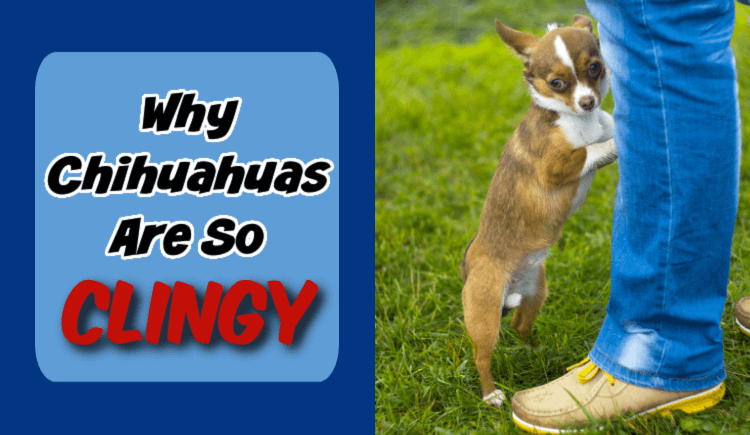
Does your Chihuahua follow you around the house, demanding to be in your lap or by your side 24 hours a day? A behavioral trait known as clinginess, it’s common in the breed.
Clingy Chihuahuas cross the metaphorical line that separates loyalty and obsession. They feel like they must be near their owner at all times. Clingy Chihuahuas will follow their owner wherever he or she goes, even to the bathroom. If this sounds familiar, you might be wondering why Chihuahuas are so clingy.
What Does Clinginess Mean?
Clinginess is a behavior characterized by a strong desire to be physically close to a person. Merriam-Webster defines it as the tendency to “stay very close to someone, such as a parent, for emotional support, protection, etc.”
There are clingy people, and there are clingy dogs. Children may cling to a parent, whereas dogs may cling to their owner. In both scenarios, the clingy child or dog will feel the need to be physically near someone. They will follow that person around wherever he or she goes.
Clingy dogs are colloquially known as velcro dogs. This is a direct reference to the popular brand of hook-and-loop fasteners. Hook-and-loop fasteners consist of a strip of hooks and a strip of loops. When pressed together, the hooks will catch the loops, thereby holding the two strips together. A clingy dog is essentially the strip of hooks, and the person to whom he clings is the strip of loops. The clingy dog will stay attached to that person at the hip.
Clinginess vs Separation Anxiety in Chihuahuas
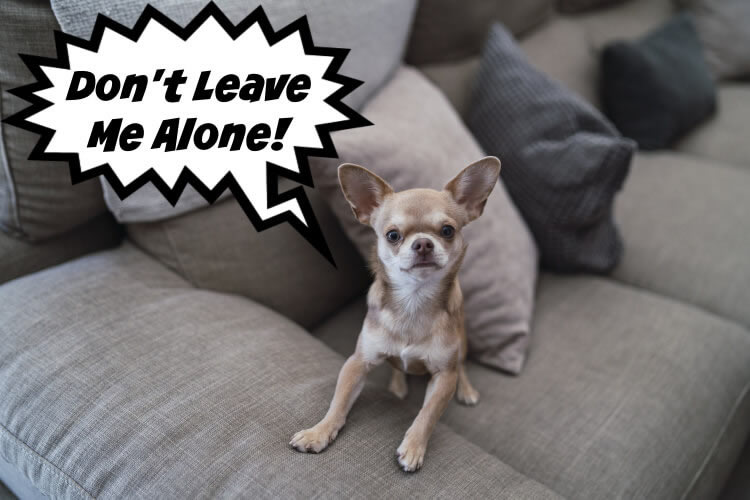
Clinginess and separation anxiety are two common types of behaviors in Chihuahuas. Some Chihuahuas have separation anxiety. Others are clingy. There are even Chihuahuas that exhibit both behaviors. While they both involve an attachment to a person, however, clinginess and separation anxiety aren’t the same.
Clinginess only involves a strong desire to be near a person. Clingy Chihuahuas want to be near that person, typically their owner, all the time. Separation anxiety is similar but with the added element of anxiety during periods of separation.
If a Chihuahua has separation anxiety, he will become emotionally distraught when separated from his owner. The Chihuahua will panic and become anxious. When his owner returns, the Chihuahua’s anxiety will subside.
Clingy Chihuahuas don’t become emotionally distraught during periods of separation. They still want to be near their owner — just like Chihuahuas with separation anxiety — but clingy Chihuahuas won’t panic and become anxious when separated. They will accept their temporary isolation without acting out and exhibiting signs of anxiety.
Chihuahuas with separation anxiety may exhibit the following signs when left alone or separated from their owner:
- Barking, howling or whining
- Scratching at doors
- Shaking
- House soiling
- Excessive panting
- Pacing or restlessness
- Loss of appetite
- Chewing furniture, shoes, pillows or other accessible objects
- Overreacting to departures and arrivals
Do Chihuahuas Cling to a Single Person?
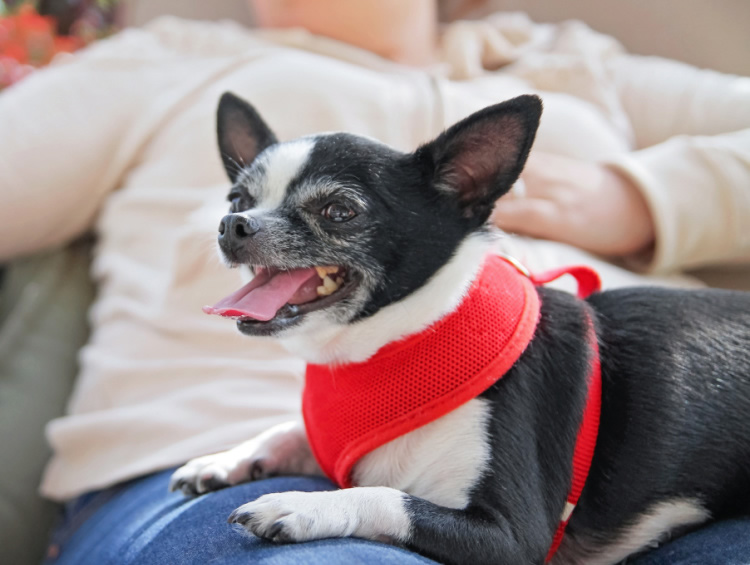
Most Chihuahuas cling to a single person. They don’t outright reject other people. After clinging to someone, Chihuahuas may show affection and loyalty toward other people, such as other family members who regularly play with them and pet sitters who regularly care for them. Nonetheless, Chihuahuas typically only cling to a single person.
Chihuahuas will often cling to the person on whom they imprint. Imprinting is a learning-related bonding process that begins during puppyhood. Puppies will choose a person — or another animal like their mother or a littermate if they are in the wild — who they trust to teach them new things. Puppies will imprint on this person, allowing that person to guide them through the world.
Most puppies imprint on the primary provider of food, comfort, affection and safety. In a domestic setting, this is typically the owner who spends the most time with the puppy. As adults, Chihuahuas will continue to follow the person on whom they imprint.
Some Chihuahuas may cling to multiple people, but most cling to a single person: the person on whom they imprint. They will develop a stronger bond with this person, preferring to follow this person over everyone else in the house.
Why Chihuahuas Are So Clingy
Chihuahuas have earned a reputation for being clingy. After imprinting on a person with whom they are particularly close, they will follow that person around. Here are some of the most common reasons Chihuahuas are so clingy.
#1) Companion Dog Origins
The Chihuahua’s origins as a companion dog may play a role in its clinginess. There are hundreds of breeds recognized by major kennel organizations like the American Kennel Club (AKC), but nearly all of them fall under one of two categories based on their purpose:
- Working dog
- Companion dog
Working dogs consist of breeds that were originally used to perform practical tasks on behalf of their owner or handler. Bloodhounds, for instance, were originally used for scent detection. With roughly 300 million olfactory receptors, they can track wild game, as well as people, better than other breeds.
Doberman Pinschers were originally bred for personal protection. In the late 1800s, German tax collector Louis Dobermann began crossing breeds, such as the Rottweiler and German Pinscher, to create a new, more protective breed.
Unlike Bloodhounds and Doberman Pinschers, Chihuahuas aren’t working dogs; they are companion dogs. Chihuahuas were originally used, and are still used, for companionship. Chihuahuas keep their owner company, providing unconditional love and loyalty to their human counterparts. Their companion dog origins predispose Chihuahuas to clinginess.
#2) Lapdog Behavior
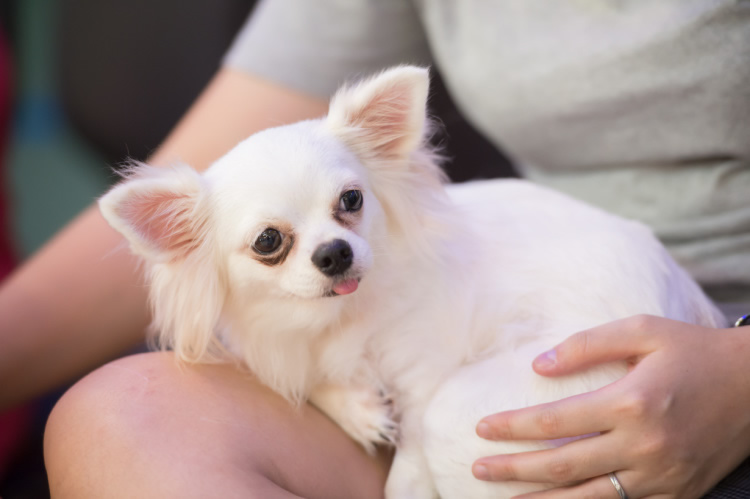
Chihuahuas can become clingy by spending so much time in their owner’s lap. They are lapdogs. Chihuahuas enjoy lying in their owner’s lap, and they are small enough to do so.
Lying in their owner’s lap is a bonding experience. Chihuahuas will develop a stronger bond with their owner. Over time, this unbreakable bond may manifest in the form of clinginess. When a Chihuahua isn’t able to sit in his owner’s lap, he may follow his owner around — a behavior that’s characteristic of clinginess.
Lapdogs also tend to get in their owner’s face. They may sit on the back of the couch and snuggle against their owner’s neck, or they may lie in their owner’s bed next to his or her head. Being close to their owner’s face promotes a stronger bond. Chihuahuas and other lapdogs have stronger bonds with their owners than larger breeds, which may contribute to their clinginess.
#3) Watchdog Instinct
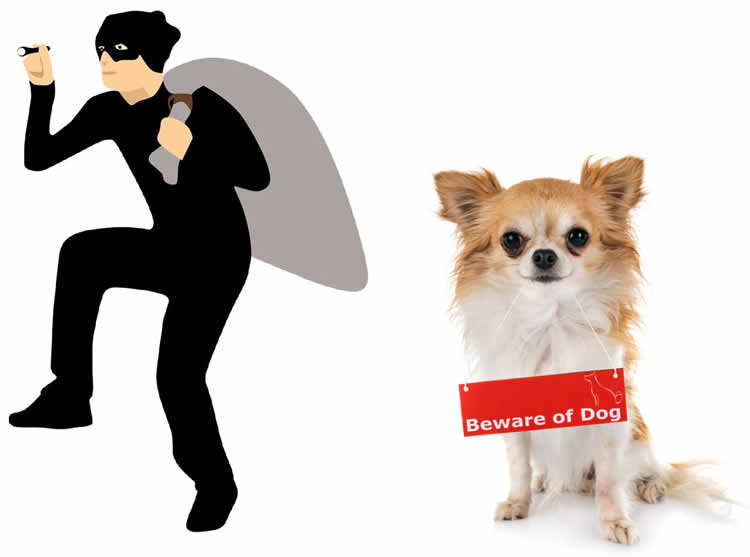
They may have originally been used for companionship, but Chihuahuas make excellent watchdogs. They have a natural instinct to guard their property and family members from threats. According to a survey published in “The Intelligence of Dogs,” Chihuahuas are the eighth most effective watchdog breed.
Their ability to sound the alarm for potential threats may a role in their clinginess. Chihuahuas are alert, courageous and protective. When they see an unfamiliar person or hear a strange noise, they may bark loudly to let their family members know.
Chihuahuas want to protect their family members from harm. An unfamiliar person could be a burglar trying to break into the home. A strange noise could be an electrical fire. The watchdog instinct in Chihuahuas may compel them to follow their owner, acting as a true guardian and protector.
#4) Boredom
Some Chihuahuas are clingy because they are bored. All dogs need mental and physical stimulation. It allows them to release their pent-up energy while subsequently staving off boredom and its side effects.
Chihuahuas that don’t have an outlet for their energy will become bored. When bored, they may act out by chewing on furniture, destroying pillows or simply making a mess. Other Chihuahuas may cling to their owner when bored. They don’t have anything else to do, so bored Chihuahuas may follow their owner around the house.
#5) Heat Cycle
Female Chihuahuas may become particularly clingy during their heat cycle. Unless spayed, they will typically go into heat two to three times per year. During these heat cycles, female Chihuahuas may become extra needy while demanding their owner’s attention.
Also known as an estrous cycle — not to be confused with the “estrus” stage of this cycle — a heat cycle is a reproductive cycle. Excluding humans, most female mammals have them during their fertile years.
Heat cycles consist of the following four stages:
- Proestrus: The Chihuahua’s estrogen levels rise, resulting in swelling of the vulva, bleeding and behavioral changes that make the Chihuahua more receptive to males.
- Estrus: Lasting about five to 10 days, this is the breeding stage. The Chihuahua’s luteinizing hormone (LH) and progesterone levels will increase, and her estrogen levels will decrease. These hormonal changes will compel her to court suitable males.
- Diestrus: The Chihuahua will stop seeking courtship during the diestrus stage. If pregnant, her estrogen levels will rise. If not pregnant, the Chihuahua’s hormone levels and behavior will return to normal.
- Anestrus: The final stage of a heat cycle, anestrus involves uterus involution. It will last until the Chihuahua’s next heat cycle.
Clinginess usually occurs during the proestrus stage. As the Chihuahua’s body chemistry changes, so will her behavior. She may become snappy, or she may become more affectionate. Chihuahuas that become more affectionate during the proestrus stage may cling to their owner until the estrus or diestrus stage.
#6) Injury or Illness
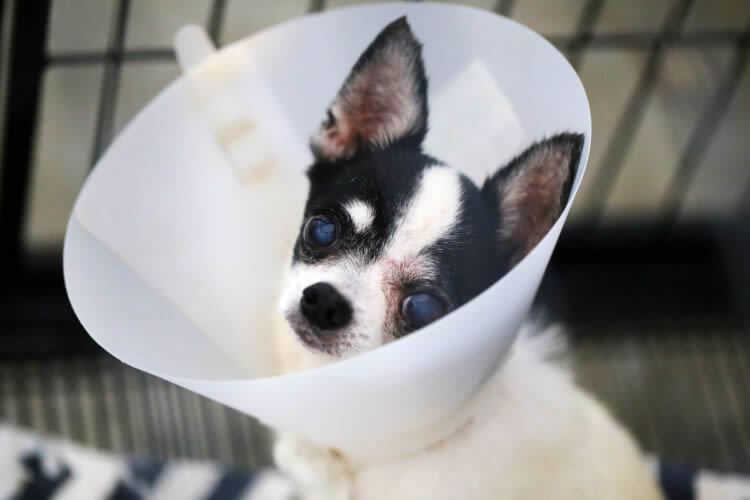
A Chihuahua’s clinginess may be attributed to an injury or illness. Chihuahuas seek their owner’s attention when they aren’t feeling well. It’s their way of asking for help. Chihuahuas will feel more secure near their own, and they recognize their owner as being their primary caregiver. Depending on what’s wrong with them, their owner may be able to treat the Chihuahua’s injury or illness.
If a Chihuahua is about to have a seizure, he may seek the comfort of his owner. The AKC Canine Health Foundation (CHF) says that roughly one in 100 dogs are epileptic. Chihuahuas, however, have higher rates of epilepsy than most other breeds. During the early stages of a seizure — before the convulsions begin — Chihuahuas may follow their owner.
Chihuahuas may follow their owner if they are suffering from an injury. Maybe a Chihuahua has a torn nail, or perhaps he was stung by a bee. Chihuahuas can perform some basic self-grooming, but they rely on their owners to treat bodily injuries.
#7) Lack of Socialization
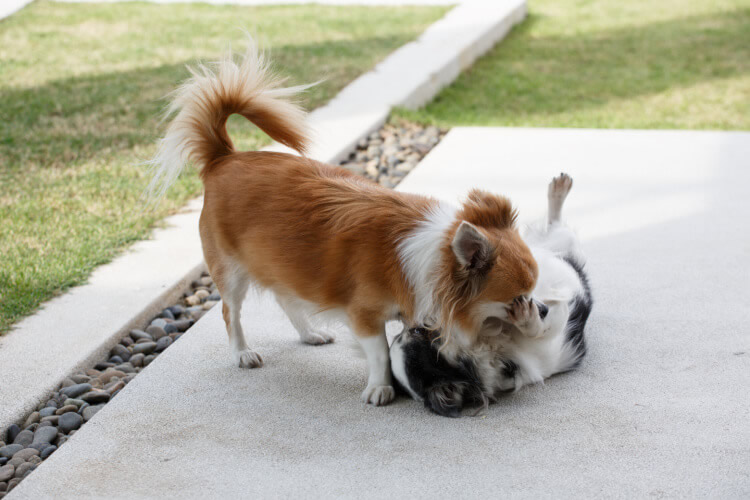
Failure to socialize Chihuahuas at a young age can lead to clinginess. According to a study conducted by researchers at the University of Guelph, roughly one-third of new dog owners don’t properly socialize their puppies.
Socialization is the process of exposing a dog to new stimuli, such as places, scents, people and other animals. It helps to prevent behavioral problems. When properly socialized, Chihuahuas will feel comfortable in social scenarios. They will be less likely to cling to their owner and, instead, will happily interact with the people and pets around them.
Here are some tips on how to socialize a Chihuahua:
- Begin socializing as soon as possible, preferably while your Chihuahua is still a puppy.
- Invite friends and family over to play with your Chihuahua.
- Take your Chihuahua to local dog parks.
- Take your Chihuahua for walks around the neighborhood.
- Take your Chihuahua for car rides.
#8) Emotional Trauma
Emotional trauma is a common cause of clinginess in Chihuahuas. Traumatic events, by definition, are scary. They are incidents that instill fear in Chihuahuas.
Some Chihuahuas are abused during puppyhood. Others are abandoned. After being adopted from an animal shelter, these Chihuahuas may become clingy. They will remember the fear of being abused or abandoned by their previous owner, which may compel them to seek comfort by clinging to their new owner.
Any fear-inducing incident can cause emotional trauma and pave the way for clinginess. A Chihuahua may experience emotional trauma after being attacked by another dog, or he may experience emotional trauma after a professional groomer accidentally cuts his nails too deep.
Traumatic events will trigger a Chihuahua’s fight-or-flight instinct. The Chihuahua will perceive the event as potentially harmful, so he will naturally fear it. He will then become afraid of similar events in the future in an effort to survive.
If the Chihuahua was previously attacked by another dog, he may fear other dogs. If the Chihuahua was abandoned by his previous owner, he may fear being alone. He may not remember the circumstances of the traumatic event, but he will associate it with the feeling of fear. And when the Chihuahua is afraid, he may cling to his owner for comfort.
#9) Old Age
Old age can cause clinginess in Chihuahuas. Small dogs are generally considered seniors at about 10 to 12 years of age, compared to 6 to 8 years of age for large dogs. As they transition from adulthood into seniorhood, their bodies will change. Some of these changes may make them more dependent on their owner.
Senior Chihuahuas may experience vision or hearing loss. They won’t be able to see or hear as well as they did in their younger years, so they’ll cling to their owner for assistance.
Canine cognitive dysfunction (CCD) may cause clinginess in senior Chihuahuas as well. Research shows that it affects 14.2% to 22.5% of all dogs over the age of 8. Also known as canine dementia, CCD involves the age-related slowing or deterioration of cognitive function. It’s essentially the canine version of Alzheimer’s. Senior Chihuahuas with CCD may feel confused or afraid, so they’ll follow their owner.
#10) Young Age
Both old and young Chihuahuas may exhibit clinginess. It’s normal for puppies to cling to their owner. In the wild, puppies rely on their mother and littermates for survival. They stay together in a pack for food, comfort, warmth and protection from predators.
When pulled away from their mother — most puppies are separated from their mother at about 8 weeks of age — puppies will maintain their social instinct. They don’t want to be left alone. Instead, they will instinctively follow other people and animals around them.
Puppies go through three developmental stages: the neonatal stage, the transitional stage and the socialization stage. While puppies may exhibit clinginess during any of these three stages, clinginess is most common during the socialization stage. The socialization stage lasts from 3 to 12 weeks of age. Puppies in the socialization stage are eager to learn, so they’ll often cling to their owner.
#11) Stress

Stress is a common cause of clinginess in Chihuahuas. Stress is a state of mental tension. When Chihuahuas — as well as people for that matter — encounter a potential threat, their bodies will produce more stress hormones. Elevated levels of stress hormones like cortisol will change a Chihuahua’s behavior.
Stress and anxiety go hand in hand. A stressed-out Chihuahua will typically feel anxious, which may compel him to follow his owner. Owners provide a sense of comfort for their four-legged companions. By following his owner, the stressed-out Chihuahua will feel safer and more relaxed.
Loud noises can trigger stress in Chihuahuas. When they hear fireworks or construction work going on outside, Chihuahuas may seek the comfort of their owner. A change in routine can also trigger stress in Chihuahuas. Chihuahuas are creatures of habit. Abruptly changing a Chihuahua’s typical day-to-day routine can leave him feeling stressed. Regardless of what triggered his stress, he may cling to his owner for comfort.
#12) Rewards
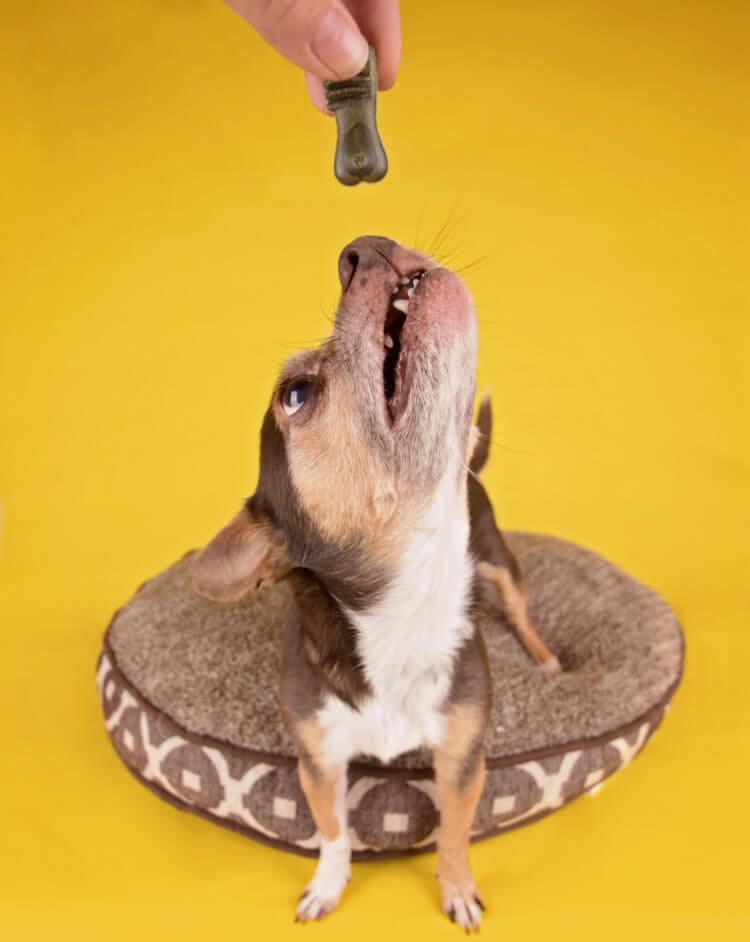
Chihuahuas may become clingy if they are rewarded for doing so. Chihuahuas repeat behaviors for which they are rewarded. Clinginess is a behavior. If a Chihuahua gets a treat, neck scratches or praise when following his owner, he may continue to follow his owner.
Rewards are the foundation of positive reinforcement training. Owners can train their Chihuahuas to perform tasks, such as going to the bathroom outside, by rewarding them. Most owners don’t intentionally train their Chihuahuas to be clingy, but the result is the same: Chihuahuas that are rewarded for following their owner will be hard-wired to do so.
Rewards work by triggering the release of feel-good hormones like dopamine. When Chihuahuas have high levels of dopamine, they’ll feel happier and calmer.
Consistently rewarding a Chihuahua for performing a task will allow his brain to create an association between the reward and the respective task. The Chihuahua’s brain will want more dopamine, so he will willingly perform the task for which he is typically rewarded. The Chihuahua may continue to use the bathroom outside to get the reward, or he may continue to follow his owner.
#13) Curiosity
Curiosity may compel Chihuahuas to cling to their owner. Chihuahuas are curious creatures by nature. They want to know what’s going on around them, especially in their home. Rather than sitting in their crate or lying in their bed, they may follow their owner.
The curiosity of Chihuahuas can be traced back to their ancestors. From goliath-sized Bullmastiffs to tiny Chihuahuas, all dogs are descendants of wolves. Wolves had to explore their environment to survive in the wild. It allows them to find food, avoid predators and adapt to changing conditions.
Modern-day Chihuahuas no longer need to explore their surroundings to survive, but they still possess this curiosity-driven instinct as their wolf ancestors. Some Chihuahuas will explore on their own. Their social nature, though, means they are more likely to explore in their owner’s presence. A curious Chihuahua may follow his owner from room to room so that he doesn’t miss out on anything.
Other Clingy Breeds
All dogs can be clingy, but some breeds are more likely to exhibit this behavior than others. The Chihuahua is just one of many clingy breeds. What are some other clingy breeds exactly?
In addition to the Chihuahua, other clingy breeds include:
- American Eskimo Dog
- Bichon Frise
- Boston Terrier
- Brussels Griffon
- Bulldog
- Cavalier King Charles Spaniel
- Chinese Crested
- Cocker Spaniel
- Dachshund
- French Bulldog
- Golden Retriever
- Havanese
- Italian Greyhound
- Japanese Chin
- Labrador Retriever
- Lhasa Apso
- Maltese
- Miniature Schnauzer
- Papillon
- Pekingese
- Pomeranian
- Pug
- Shetland Sheepdog
- Shih Tzu
- Tibetan Spaniel
- Yorkshire Terrier
Is Clinginess a Problem?
Some owners find clinginess to be annoying. They still love their Chihuahuas, but they don’t want their four-legged companions following them around all day long. Clingy Chihuahuas won’t give them any space, so owners won’t have the luxury of privacy.
Clingy Chihuahuas stay right behind their owner. When vacuuming or doing other household chores, owners will have to watch where they step. Owners who aren’t careful may accidentally step on their Chihuahua.
Whether clinginess is a problem often depends on the cause. Clinginess attributed to an injury or illness is a problem. Chihuahuas can’t treat their own injuries and illnesses, so many of them will cling to their owner for help. Owners should seek veterinary care if their Chihuahuas are injured or sick. Neglecting to take them to a veterinarian could result in their condition worsening.
Clinginess attributed to boredom is also a problem. Boredom leads to behavioral problems, such as clinginess, and it can even cause depression. Fortunately, boredom is preventable. Owners can prevent their Chihuahuas from becoming bored by providing them with plenty of mental and physical stimulation.
Clinginess may be a sign of separation anxiety, or it may progress into separation anxiety. Separation anxiety is exactly what it sounds like: a behavioral disorder that involves anxiety-related symptoms when a Chihuahua is separated from his owner.
Chihuahuas with separation anxiety will often cling to their owner. They’ll have an unhealthy attachment to their owner — to the point of becoming anxious when they are left alone. Because of their fear of being left alone, they may follow and cling to their owner.
Even if a Chihuahua is only clingy, he may develop separation anxiety. One study found that “several factors associated with hyperattachment” were significantly associated with separation anxiety in dogs. Hyperattachment is clinginess. For the study, researchers evaluated 200 dogs with separation anxiety. They found that clinginess was a major risk factor for separation anxiety.
How to Make Your Chihuahua Less Clingy
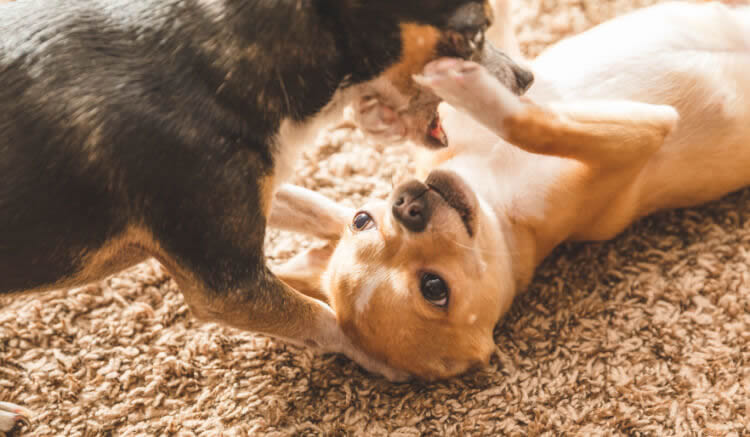
There are several things you can do to make your Chihuahua less clingy. Giving him more exercise, for instance, may prove helpful. Lack of exercise can lead to boredom, which as previously mentioned, is a common cause of clinginess.
To curb his clinginess, take your Chihuahua on at least two walks and give him at least a half-hour of additional exercise per day. Exercise can consist of playing games like tug-of-war, fetch or hide-and-seek. Daily exercise such as this will provide your Chihuahua with physical stimulation and reduce the risk of clingy behavior.
Mental stimulation is equally important in the prevention of clinginess. It will force your Chihuahua to think. Mental stimulation will keep your Chihuahua’s mind sharp while warding off depression, stress, cognitive decline and clinginess.
Here are some ways to provide your Chihuahua with mental stimulation:
- Teach your Chihuahua a new trick, such as how to sit or shake paws.
- Assign names to your Chihuahua’s toys and train your Chihuahua to recognize them.
- Give your Chihuahua a puzzle toy.
- Create scent-based scavenger hunts.
- Change up your Chihuahua’s environment via socialization.
- Enroll your Chihuahua in an obedience class.
You can make your Chihuahua less clingy by socializing him. As your Chihuahua is exposed to new places, scents, people and other animals, he will become more independent. He won’t feel the need to follow you all the time. A well-socialized Chihuahua will feel comfortable being away from his owner.
While socialization is most effective during the socialization stage of a puppy’s life, it’s never too late to socialize a Chihuahua. It may require more treats, but you can socialize your Chihuahua at any age. Just take him to different places where he’s exposed to different stimuli.
Don’t make a big deal out of departures and arrivals. A common mistake owners make when dealing with a clingy Chihuahua is petting and praising them before they leave. They know their Chihuahuas will miss them, so they pamper their four-legged companions before walking out the door. And when they return home, owners may immediately pet and praise their clingy Chihuahua again.
Giving your Chihuahua a little TLC before leaving and after returning home may sound harmless, but it can encourage clinginess. Your Chihuahua will begin to think of departures and arrivals as a “big deal.” so he will follow you. Rather than giving him attention immediately before you leave and after you return, ignore him.
Another way to make your Chihuahua less clingy is to desensitize actions that trigger his clinginess. Your Chihuahua may follow you whenever you walk to the refrigerator for a snack, or he may follow you when get your shoes from the closet. Densentiziation is the process of repeating a particular action so that your Chihuahua becomes accustomed to it. If you repeatedly walk to the refrigerator or closet — and you don’t reward or otherwise give your Chihuahua attention when doing so — he may stop following you.
In Conclusion
Chihuahuas make wonderful companions, but many of them are clingy. They follow their owner wherever he or she goes. Some of the top causes of clinginess in Chihuahuas include their companion dog origins, laptop behavior, watchdog instinct, boredom, heat cycle, injury or illness, lack of socialization, emotional trauma, old age, young age, stress, rewards and curiosity.
If clinginess is a problem with your Chihuahua, you can follow the tips listed above to make him less clingy. If it’s not a problem, you can ignore this behavior. Regardless, it’s your responsibility to set boundaries for your Chihuahua.
References:
https://vetmed.illinois.edu/wp-content/uploads/2021/12/Preventing-Separation-Anxiety-compressed.pdf
Is your Chihuahua super clingy? We’d love to hear about it in the comments section below!